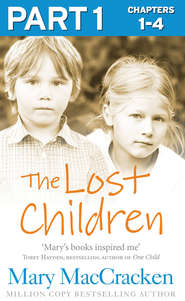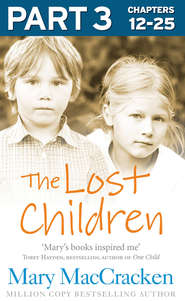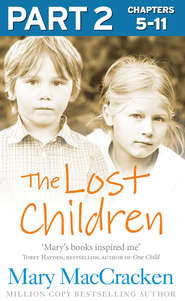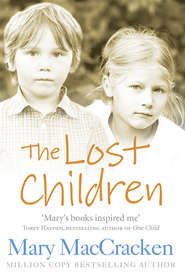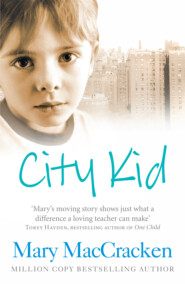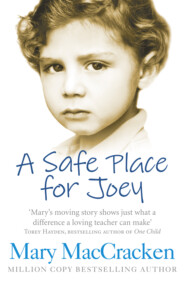По всем вопросам обращайтесь на: info@litportal.ru
(©) 2003-2024.
✖
Lovey
Настройки чтения
Размер шрифта
Высота строк
Поля
I moved towards the door. ‘Turn off the record player, please, Jamie. Okay, Brian, Hannah. Rufus, get the lights, please. We’re going next door to Patty’s room for Circle.’
Hannah, of course, sat without moving, but the boys moved quickly out the door and down the hall.
I waited one more minute to see if Hannah would change her mind. Nothing. Only her eyes flickered, alert, wary, watching me. Her face and neck were grimy, the pink wads of gum were still in her hair, but her dress was clean. It was the same shapeless style, tied at the waist with a string, but clean. I left Hannah in the closet and walked down the hall after the boys. A clean dress. Somebody cared about Hannah.
The coat closet became Hannah’s place in our room. She sat there most of the first two weeks. She had her own cupboard, her own table and chair, even her own work folder, but she barely touched them. In the beginning her grief and anger and confusion were too large to let her work. The most important thing just then, more important than work or discipline, was to let her know that we accepted her.
Children can’t begin to learn until they feel safe, and they can’t feel safe until they are honestly and completely accepted. A child like Hannah – hospitalised at six weeks, shut in closets, locked out of her home, beaten by both her brother and her father, rejected by the public school – not only feared other people, she feared herself as well.
Hannah knew she was different; she knew that parts of her were frightening, both to herself and others. But she didn’t know how to change. She couldn’t cut herself in pieces, divide herself in two, bring in only the good part. She needed to know that she was welcome, all of her, the good and the bad. That was enough for now. Changes could come later.
Hannah seemed to understand some of this, and gradually she became more peaceful. Each morning she left her bus and came through the Director’s office, down the hall, and into our classroom, closing the hall door behind her. She hung her sweater on the hook beneath her name and then settled herself in the closet to watch the boys arrive. She never greeted me, but she watched Rufus, Jamie, and Brian as they called to each other or exchanged a hug with me. The boys invariably left our door open and Hannah would get up each time and carefully, softly, close them again. It was as if she realised that she was safe in our room.
Although she didn’t participate, she watched us closely. There is no better teacher than another child. As Hannah watched the others, I knew the time would come when she would begin trying to do herself what she had seen the boys do.
Hannah was learning although she never opened her work folder. She began to touch it more often, going to her cupboard to run her finger across the name I had printed above it and taking out her folder, her paint smock, her book and notebook. None of them were ever used, but still they were hers. She would hold them in her lap and then put them carefully away and return to her seat in the coat closet. She was learning the details of our lives.
Details and routine. Outside of school I never planned ahead, avoiding ruts as much as possible. In school, however, our routine was the same each day. In the topsy-turvy world of emotionally disturbed children, routine provides security. The sameness of each day made it easier for them to cope.
The children arrived at nine o’clock and the first half hour was one of the most important of the day, although it might not seem so to an uninformed eye. Crises of the night before exploded in the classroom, and it was important for the teacher to be there to comfort or control. Treasures were brought in, and the teacher had to be there to share the pleasure of each small discovery. Sometimes problems arose on the way to school, or a child arrived without breakfast and the teacher needed to go down to the refrigerator in the furnace room for the milk and cereal that were always kept there. Although our children were not primarily underprivileged, often there was so much chaos in their homes that breakfast was impossible.
By nine thirty most personal crises had been dealt with and we were ready for the larger world of Circle. Circle was a kind of morning assembly where the whole school gathered together. At least we had until this year. Now we were too many for one room, and so the Director had divided us into two groups, the older children in one, the younger children in the other. During this time there was singing and dancing and group games. The purpose was threefold: to help the children relate and participate in a group, to improve gross motor coordination, and also to give the teachers the opportunity to see the other children in the school. At staff meetings on Wednesdays we discussed everyone, and it was necessary that we had at least a surface knowledge of each child.
After Circle, the children went to the bathroom and then came back to their classrooms. For the rest of the day, each teacher had a special programme for each child.
In our room we started with the Best and the Worst. In searching for ways to help the children learn to communicate, I had discovered Best and Worst. Most of our children had grave difficulty with communication. Some couldn’t talk at all; some were elective mutes, able to talk but refusing to do so; some, like Rufus, were too verbose; some articulated clearly but without meaning. Because communication is so important, I worked hard at finding ways to involve the children.
‘Show and Tell’ didn’t work. Our children had little to show and nothing to tell. To get through to them it was necessary to turn up the volume and intensity of communication.
A question like ‘Tell me what you did yesterday’ didn’t bring any response; it was too general, too vague. But when each and every day I asked them to report on the Best Thing and the Worst Thing that had happened to them, they not only responded, they began to savour the opportunity. Like most ideas, this started small and grew. When I had first asked the question four years before, answers had been a word or two at the most. But I insisted they all have a chance, whether they used it or not, and gradually they all began to talk a bit and – more amazing still – to listen to each other.
There were different children then – only Brian still remained of that first group – but each day we talked a little more until it became necessary to have limits, so that no one child could monopolise the time. Then, because the world of fantasy was so vivid – even more so than to other children, and therefore less distinct from reality – the Best Thing became their wishes, the Worst their dreams. This, of course, was good – so good and so surprising that the school psychiatrist who visited our class shook his head in amazement as he heard children labelled ‘schizophrenic’ or ‘autistic’ talk and listen to each other.
But it wasn’t enough simply to get the children to talk. I wanted them to understand the difference between reality and fantasy. It seemed to me that if they were ever to travel all the way back to live in the world, they needed to know and be able to differentiate between the two. So there got to be two parts to Best and Worst, ‘real’ and ‘pretend’, and the children sternly reminded each other of this. If a child began to talk about trucks as though they were people, calling the headlights ‘eyes’, another child was sure to remind him, ‘First the real, then the pretend.’
So Best and Worst became a part of my teaching equipment, and today, as usual, we pushed tables together, directly after Circle, all of us eager to begin. In order to have time for reading, language, arts, and maths, and then to go outside or play before lunch, each child was only allowed five minutes – but to me it was one of the most important parts of the day.
After lunch there was a rest period, then art, science, films, playground and auditory and visual motor training. The afternoon went by even more quickly than the morning. The day was too short; there was never enough time to do all that I had hoped to do.
During those first two weeks I made no demands on Hannah, letting her absorb the details and atmosphere of the school, letting the boys grow used to her, letting peace and a semblance of tranquility return to the class. Her despair no longer seeped constantly into our room, corroding the warm safety. As long as I asked nothing of Hannah she was quiet, sitting half in, half out of the closet, eating out of her paper bag when she felt like it, watching us all the time.
But this interlude was almost over; Mrs Rosnic was scheduled to come in to see me the third Monday after school started. I felt that after that I could begin to ask more of Hannah.
Chapter 4 (#u82169d21-2612-57d6-bea3-c88eb9c7f6f5)
Hannah’s mother came heavily, hesitantly, into our classroom. She was a large woman dressed in a cotton housedress just like Hannah’s, although hers reached only to her knees and was covered with a dark cloth coat.
I had telephoned Mrs Rosnic at the end of that first day to ask if she could come in for a conference. Although she was hesitant and it had taken two weeks, she was here and I was grateful. Helping Hannah was not going to be easy. She was going to have to give up old established ways and learn new ones. There were difficult weeks ahead, and before I initiated any major changes at school I wanted to talk to Hannah’s mother and learn what Hannah was like at home. I needed to fill in the gaps left by the psychological reports, to find out what sort of relationship there was between Hannah and her brother and sister, between Hannah and her mother. Our school day was only five and a half hours long. There were eighteen and a half other hours I wanted to know about.
I had been sitting at one of the low tables, but as Mrs Rosnic hesitated in the doorway I got up and walked towards her. ‘Please come in.’
But she remained where she was, her eyes moving rapidly around the room. By now the boys’ papers and drawings covered one wall. We had begun a large mural on another, but the only sign of Hannah was her name on her cubby and above the coat hook in the closet.
‘May I take your coat?’ I asked.
For the first time Mrs Rosnic looked directly at me and it was my turn to stop, startled by the fear in her eyes.
As gently as I could, I took her coat and hung it in the closet beside my own light sweater, and then, impulsively, I moved them both so that they hung together on Hannah’s own hook. I came back and sat down at the round wooden table. ‘Thank you for coming in,’ I said. ‘I know how difficult it must be for you to get away with the three children at home, but I wanted to talk to you a little bit about Hannah. I’m happy to have her in my class this year.’
Mrs Rosnic came across the room then, stopping in front of me. ‘You not getting rid of her?’
So that was the fear; it was still there in her chopped, guttural speech. There were traces of an accent. I must remember to check and see what language was spoken in the home. It was possible that much of Hannah’s garbled speech was a poor imitation of the words she heard exchanged between her mother and grandfather. But that could come later.
Now I had to get through that fear, let Mrs Rosnic know that I didn’t want to get rid of Hannah. On the contrary, what I wanted was to get closer, know more. The best way I knew was to say it simply and straight.
‘I won’t get rid of Hannah,’ I promised. ‘She’ll be here in this class all year.’
Mrs Rosnic sat down opposite me then, her eyes never leaving my face. ‘In other school, every time they call me for conference, they warn Hannah is too bad. They say she have to go.’
‘Not here. When I call you, it’s because I want to know more, try to figure out how to help more.’
Mrs Rosnic drew in her breath and then let it out in a long, slow sigh, but as her body relaxed, more of her weariness showed. ‘Ah, she is so hard, that one. I don’t know what to do with her. Yelling, screaming half the time. Most other time she just sits, dumb, do nothing. Once in while she play joke. Put mouse in Grandpa’s bed and laugh and laugh when he yell.’
I tried to picture the house. I knew Grandpa lived downstairs, but where would Hannah get a mouse?
‘A real mouse?’ I asked.
‘Lots of mice around. They’re not trouble. Hannah like them. The cats are good, get rid of most of mice. Only if rats come, then the cats scared.’
‘Mrs Rosnic, Hannah doesn’t talk to us here at school. Does she talk at home?’
‘She not talk Carl or Grandpa, but sometime she talk to me. Say yes, no, other words. Grandpa say she not make sense, but I know what she mean.’
It was hard to tell from this whether Hannah spoke more or whether Mrs Rosnic’s interpretations were better.
‘Listen,’ I said, ‘what’s Hannah like in other ways at home? I know she goes to the bathroom by herself. Does she wash, brush her teeth and dress herself?’
‘No.’ Mrs Rosnic’s sighs were deep now. ‘She never wash. She sleep in dress all night. Won’t get out of it. Next morning Carl or Grandpa hold her and I get other dress on her.’
‘Carl. Does Hannah play with him or with her sister?’
‘Play? Nobody play. Just fight, fight, fight. At each other day and night. Carl tease her all the time. Now he tell her she going to retard school and she cry and cry.’
I felt like crying myself. Poverty, dirt, ridicule. I looked away for a minute, trying to clear my mind, to see what to do next. I turned back to Mrs Rosnic. ‘What about friends? Does Hannah play with other children on the block?’
Mrs Rosnic sat up straight, definite now. ‘I careful with her. Keep her in back yard so neighbour kids not make fun. Sometime when I fixing Grandpa’s food she get away, but not much. Mostly I keep her near.’ A wistful look came over Mrs Rosnic’s face. ‘Sometime I wish … I think how good if she could help some. You know. Like set table. Maybe even dry dishes.’
I reached across the table. If she had been a child I would have touched her then, but instead I touched the water glass of the roses and left my hand out open on the table.






